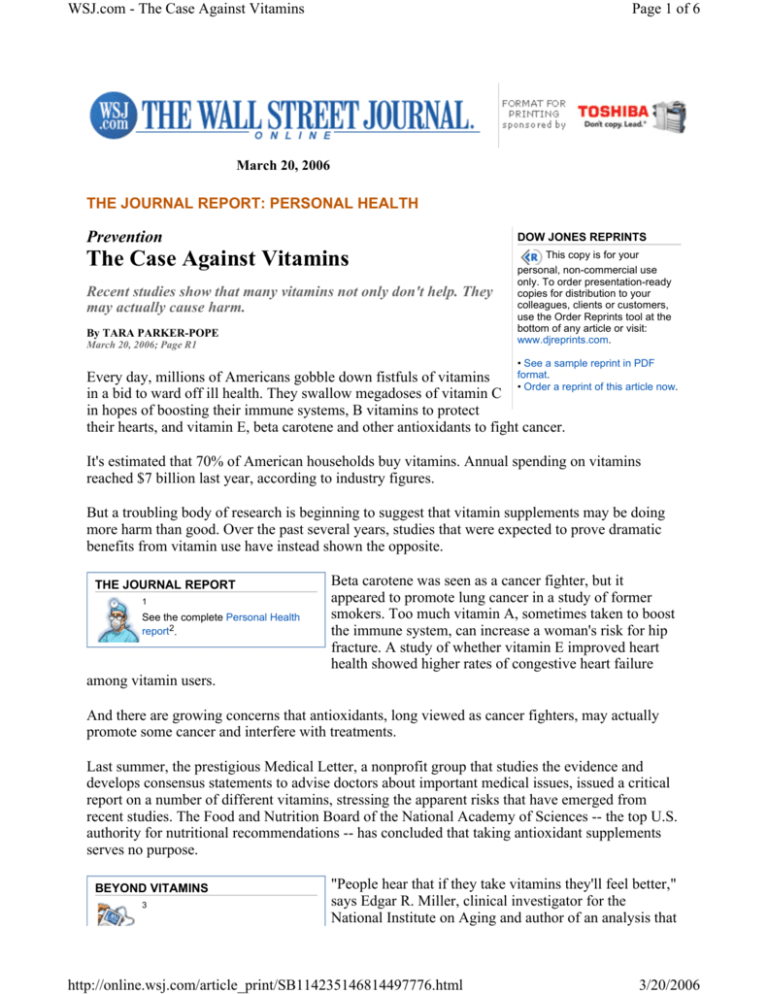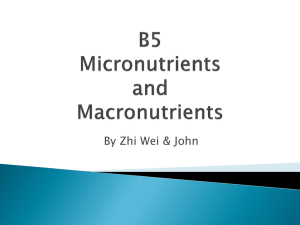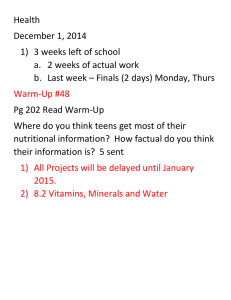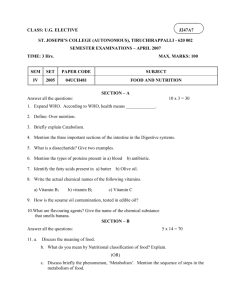
WSJ.com - The Case Against Vitamins
Page 1 of 6
March 20, 2006
THE JOURNAL REPORT: PERSONAL HEALTH
Prevention
DOW JONES REPRINTS
The Case Against Vitamins
This copy is for your
personal, non-commercial use
only. To order presentation-ready
copies for distribution to your
colleagues, clients or customers,
use the Order Reprints tool at the
bottom of any article or visit:
www.djreprints.com.
Recent studies show that many vitamins not only don't help. They
may actually cause harm.
By TARA PARKER-POPE
March 20, 2006; Page R1
• See a sample reprint in PDF
format.
Every day, millions of Americans gobble down fistfuls of vitamins
• Order a reprint of this article now.
in a bid to ward off ill health. They swallow megadoses of vitamin C
in hopes of boosting their immune systems, B vitamins to protect
their hearts, and vitamin E, beta carotene and other antioxidants to fight cancer.
It's estimated that 70% of American households buy vitamins. Annual spending on vitamins
reached $7 billion last year, according to industry figures.
But a troubling body of research is beginning to suggest that vitamin supplements may be doing
more harm than good. Over the past several years, studies that were expected to prove dramatic
benefits from vitamin use have instead shown the opposite.
THE JOURNAL REPORT
1
See the complete Personal Health
report2.
Beta carotene was seen as a cancer fighter, but it
appeared to promote lung cancer in a study of former
smokers. Too much vitamin A, sometimes taken to boost
the immune system, can increase a woman's risk for hip
fracture. A study of whether vitamin E improved heart
health showed higher rates of congestive heart failure
among vitamin users.
And there are growing concerns that antioxidants, long viewed as cancer fighters, may actually
promote some cancer and interfere with treatments.
Last summer, the prestigious Medical Letter, a nonprofit group that studies the evidence and
develops consensus statements to advise doctors about important medical issues, issued a critical
report on a number of different vitamins, stressing the apparent risks that have emerged from
recent studies. The Food and Nutrition Board of the National Academy of Sciences -- the top U.S.
authority for nutritional recommendations -- has concluded that taking antioxidant supplements
serves no purpose.
BEYOND VITAMINS
3
"People hear that if they take vitamins they'll feel better,"
says Edgar R. Miller, clinical investigator for the
National Institute on Aging and author of an analysis that
http://online.wsj.com/article_print/SB114235146814497776.html
3/20/2006
WSJ.com - The Case Against Vitamins
PODCAST:4 If vitamins may be doing more
harm than good, what about other dietary
supplements? The Journal's Tara ParkerPope examines5 some recent studies that
suggest supplements don't really work, and
explains why the reality may be more
complicated than that.
Page 2 of 6
showed a higher risk of death among vitamin E users in
several studies. "But when you put [vitamins] to the test
in clinical trials, the results are hugely disappointing and
in some cases show harm. People think they are going to
live longer, but the evidence doesn't support that.
Sometimes it's actually the opposite."
Not everybody is buying these results. Consumers remain devoted to their vitamin regimens.
Industry groups such as the Council for Responsible Nutrition reject the recent evidence, saying
the research is flawed or the people studied were too sick to start with, making it impossible to
draw any broad conclusions for the rest of us. "I don't think it's black and white," says Andrew
Shao, vice president of regulatory and scientific affairs for the council. "It's important to know
that a lot of these studies have been done in diseased populations. I suppose the expectations are
too high. These vitamins are not drugs. They can't be expected to cure or reverse 20, 30 or 40
years of disease."
Everyone needs vitamins, which are key nutrients the body can't make. But micronutrients from
foods usually are adequate to prevent vitamin deficiency, which is rare in the U.S. Even so,
vitamin B-12 supplements for the elderly and folic acid for women of child-bearing age are
recommended.
But the proven benefits of a few supplements pale next to the growing concerns about widespread
vitamin use. Nobody knows why high doses of vitamins taken as pills might cause harm. One
theory has to do with free radicals, a common byproduct of the normal chemical reactions that
occur in cells. Every day cells get damaged due to a variety of factors including sunlight, the
foods we eat and natural aging. This creates free radicals, highly reactive molecules that can
damage tissues and lead to cancer and heart disease. Although the body has several ways of
coping with free radicals, many people believe high doses of vitamins help, mopping up free
radicals before they can do much damage.
But the problem is that free radicals may serve an important purpose,
sending a powerful signal to the body's immune system, which enlists
its own army of soldiers to fight the free radicals and fix the damage.
The theory is that by taking vitamins, we undermine that message
system and upset the balance of antioxidants and free radicals in the
body. It may be that vitamins clean up the free-radical mess, but the
immune system isn't alerted to fix the damage, allowing disease to set
in.
Another concern is that while vitamins from food sources are necessary
and good for you, consumers today often scarf down vitamins at levels
that are more like a pharmaceutical dose than something found in
nature. In a test tube, high doses of a single antioxidant can turn bad,
evolving into pro-oxidants -- meaning they start to oxidize and create
free radicals, causing the very problem you were trying to prevent.
Here's a look at what science shows about the risks and benefits of some particular vitamins.
VITAMIN E
Vitamin E has long been touted as beneficial to heart health, based in part on observational studies
http://online.wsj.com/article_print/SB114235146814497776.html
3/20/2006
WSJ.com - The Case Against Vitamins
Page 3 of 6
that have shown diets rich in fruits and vegetables containing E and other vitamins are associated
with a decreased risk of coronary disease. Vitamin E also has been studied as a way to help
Alzheimer's disease and to prevent prostate cancer.
But research into vitamin E supplements has been disappointing. Most clinical trials in recent
years have been inconclusive or shown no benefit -- and some have suggested harm. The
University of California-Berkeley Wellness Letter, from the same institution that discovered the
vitamin in 1922, last year said it no longer recommended vitamin E supplements because of the
data showing no benefits.
Last year, Johns Hopkins University researchers in Baltimore published a shocking finding. After
reviewing the data from 19 vitamin E clinical trials of more than 135,000 people, the analysis
showed high doses of vitamin E (greater than 400 IUs) increased a person's risk for dying during
the study period by 4%. Taking the vitamin E with other vitamins and minerals resulted in a 6%
higher risk of dying.
Not everyone agrees with the methods used in the study. And most of the patients were already
unhealthy, so the results may not apply to healthy people.
Since the analysis was published, another study of about 9,500 patients evaluated long-term use of
400 IUs of vitamin E daily. The study didn't show any statistically meaningful differences
between vitamin users in terms of cancer, heart attacks or stroke, but the vitamin E takers had a
13% higher risk for heart failure.
The risk of taking vitamin E for cancer is also of concern. Last year, the Journal of Clinical
Oncology published a study of 540 patients with head and neck cancer who were being treated
with radiation therapy. The patients took 400 IUs of vitamin E or a placebo. The supplement
reduced side effects by nearly 30%. But recurrence rates among the vitamin E users were 37%
higher. The finding was not statistically meaningful, but has raised concerns that vitamin intake
could hinder the effectiveness of treatments.
Not all the vitamin E news has been bad. Last year, the Women's Health Study evaluated use of
600 IUs of vitamin E every other day by nearly 40,000 healthy women. Overall, there was no
benefit of using vitamin E for major cardiovascular events or cancer. But a subgroup analysis
found there was a 24% lower risk for cardiovascular deaths and a 26% reduction in major
cardiovascular events among women over 65. The researchers said those findings weren't
conclusive, however, in part because they contradict other clinical-trial evidence.
Another study, called Select, is looking at whether vitamin E and selenium lower risk for prostate
cancer. The study won't finish for several years, but this summer a safety monitoring committee
will review the results to date to see whether any significant risks or benefits have emerged. In
February, another study reported in the Journal of the National Cancer Institute showed no clear
benefit of vitamin E on prostate-cancer risk, although there was benefit among a subgroup of
smokers.
The Select trial already offers a cautionary tale on vitamin use, says Eric Klein, head of urologic
oncology at the Cleveland Clinic and a Select investigator. Select was started after a study of
smokers in Finland looked at beta carotene and vitamin E to prevent lung cancer. While vitamin E
users had an unexpected lower risk for prostate cancer, the beta carotene users had a higher risk
for lung cancer. "The psyche of the U.S. population is that a nutraceutical can't be harmful and
http://online.wsj.com/article_print/SB114235146814497776.html
3/20/2006
WSJ.com - The Case Against Vitamins
Page 4 of 6
might be helpful, so why not take it?" says Dr. Klein. "That thinking is just not correct. The
message is: Be careful until the data is in."
BETA CAROTENE AND VITAMIN A
Vitamin A is a family of compounds that play a role in vision, bone health, cell division and the
regulation of the immune system. Retinol is one of the most usable forms of vitamin A. Several
carotenoids, the darkly colored pigments found in many plant foods, can be converted to vitamin
A, but beta carotene is the carotenoid that is most efficiently converted to vitamin A.
Although studies have suggested an association between diets rich in beta carotene and vitamin A
and a lower risk for many types of cancer, the supplements taken in pill form have proved risky.
The 1994 Finland study of smokers taking 20 milligrams a day of beta carotene showed an 18%
higher incidence of lung cancer among beta carotene users. In 1996, a study called Caret looked at
beta carotene and vitamin A use among smokers and workers exposed to asbestos. The trial was
stopped when the participants taking the combined therapy showed a 28% higher risk for lung
cancer and a 26% higher risk of dying from heart disease.
More recently, a 2002 Harvard study of more than 72,000 nurses showed that those who
consumed high levels of vitamin A from foods, multivitamins and supplements had a 48% higher
risk for hip fracture than nurses who had the lowest intake of vitamin A. Notably, nurses who ate
a lot of foods high in vitamin A also had higher risk, possibly indicating that too many foods are
now fortified with the vitamin. Milk, margarine and breakfast cereals are fortified with vitamin A.
High intake of vitamin A has also been associated with a higher risk of birth defects.
VITAMIN C
Ever since Nobel laureate Linus Pauling extolled the virtues of vitamin C more than 30 years ago,
Americans have been taking handfuls of the pills, convinced the vitamins do everything from
preventing colds to fighting cancer. But like other vitamin studies, research into vitamin C has
been disappointing.
Last summer, the Cochrane Database of Systematic Reviews looked at the clinical-trial evidence
for vitamin C supplements in treating the common cold. Among 23 studies, there was no overall
benefit to using vitamin C to prevent colds. However, six studies of marathon runners, skiers and
soldiers exposed to significant cold or physical stress showed about a 50% reduction in colds with
vitamin C use. But the investigators warned that these were extreme circumstances and probably
don't apply to the general population. Vitamin C may slightly shorten the duration of colds, but
the investigators said the small difference may not even be noticed by patients.
There are also concerns about risks associated with vitamin C. A 1999 analysis in the British
Medical Journal showed that in three studies, vitamin C didn't lower death rates among elderly
people, and may actually have increased the risk of dying slightly. Last year, the cancer journal
CA reported that antioxidant supplements, including vitamin C, should be avoided by patients
being treated for cancer. Scientists have found that cancer cells gobble up vitamin C faster than
normal cells, suggesting that any protection vitamin C gives might be even greater for tumors than
normal cells. In 2001 scientists showed that cancer cells may become resistant to chemotherapy
drugs after treatment with vitamin C. "It's a mistake to think that cancer cells...don't like
nutrients," says Gabriella D'Andrea, oncologist with Memorial Sloan-Kettering Cancer Center in
New York and author of the review.
http://online.wsj.com/article_print/SB114235146814497776.html
3/20/2006
WSJ.com - The Case Against Vitamins
Page 5 of 6
Whether any of the antioxidant vitamins are cancer fighters or cancer promoters remains an open
question. Although some data suggest a benefit, others suggest harm. In October 2004
Copenhagen researchers reviewed seven randomized trials of beta carotene, selenium, and
vitamins A, C and E (alone or in combination) in esophageal, gastric, colorectal, pancreatic and
liver cancer. The antioxidant users had a 6% higher death rate than placebo users.
B VITAMINS
A regimen of B vitamins, including folic acid, vitamin B-12 and vitamin B-6, has been touted as a
way to improve heart health by lowering homocysteine, an amino acid thought to be a risk factor
for heart attack. But last week, two studies presented to the American College of Cardiology
showed that while the vitamins do lower homocysteine levels, taking them doesn't lower risk for
heart attack.
The patients in the studies weren't healthy. They had diabetes, heart disease or a history of heart
attack. The New England Journal of Medicine said the consistency of the results "leads to the
unequivocal conclusion" that the vitamins don't help patients with established vascular disease.
But the medical community remains divided on whether the vitamins might still be useful for
healthy people. "This should not close the book on the investigation of whether B vitamins in a
healthy population helps reduce risk of cardiovascular disease," says Dr. Shao of the Council for
Responsible Nutrition.
Not all the research into vitamin B is controversial. Folic acid supplements for women of childbearing age have dramatically reduced the incidence of neural-tube defects in babies. Elderly
people can develop an inability to absorb vitamin B-12 from food, so supplements may be
recommended as we get older.
CALCIUM AND VITAMIN D
A 2005 study in the British Medical Journal didn't show any reduction in fracture risk among
women who took 1,000 milligrams of calcium with 800 IUs of vitamin D a day. But the Women's
Health Initiative recently suggested that calcium and vitamin D may lower hip-fracture risk in
women over 60. Calcium users, however, had a 17% higher risk for kidney stones.
Elderly people, particularly those who have dark skin, get little exposure to sunlight and don't
drink milk, are at risk for vitamin D deficiency and are typically advised to take supplements. One
study suggests the most benefit comes with about 800 IUs of vitamin D a day.
Most doctors and health experts now suggest that consumers interested in taking vitamins stick to
a multivitamin rather than concoct their own cocktails of high-dose vitamins. But even this
practice is being questioned because there's little evidence to support it. In August the British
Medical Journal looked at multivitamin use among elderly people for a year, but found no
difference in infection rates or visits to doctors.
Researchers urge caution when interpreting results from various vitamin studies. Many factors,
ranging from the type of vitamin to the age and health of the participants, may influence the
results, says Marion Dietrich, postdoctoral associate in the Nutritional Epidemiology Program at
Tufts University. What is clear, however, is the important role a healthful diet plays in preventing
illness. Large dietary-intervention studies have shown that a healthful diet reduces risk of
cardiovascular disease.
http://online.wsj.com/article_print/SB114235146814497776.html
3/20/2006
WSJ.com - The Case Against Vitamins
Page 6 of 6
But doctors say many patients view vitamins as a quick fix to compensate for poor eating habits,
and resist any suggestion that taking them may not be beneficial. "A lot of people are passionate
about their vitamins," says Dr. Miller of the National Institute on Aging. "I don't know where they
get it from, but it's not based on scientific evidence."
--Ms. Parker-Pope, who writes The Wall Street Journal's weekly Health Journal column6, served as contributing editor of
this report.
Write to Tara Parker-Pope at healthjournal@wsj.com7
URL for this article:
http://online.wsj.com/article/SB114235146814497776.html
Hyperlinks in this Article:
(1) http://online.wsj.com/page/2_1215.html
(2) http://online.wsj.com/page/2_1215.html
(3) http://podcast.mktw.net/wsj/audio/20060316/pod-wsjparkerpope/podwsjparkerpope.mp3
(4) http://podcast.mktw.net/wsj/audio/20060316/pod-wsjparkerpope/podwsjparkerpope.mp3
(5) http://podcast.mktw.net/wsj/audio/20060316/pod-wsjparkerpope/podwsjparkerpope.mp3
(6) http://online.wsj.com/search/aggregate?article-doc-type={Health+Journal\%20
{Health+Journal+Guest}%20&KEYWORDS=%
2A&COLLECTION_AGG=collection=wsjie/archive&HEADER_TEXT=HEALTH+JOURNAL
(7) mailto:healthjournal@wsj.com
Copyright 2006 Dow Jones & Company, Inc. All Rights Reserved
This copy is for your personal, non-commercial use only. Distribution and use of this material are governed by our
Subscriber Agreement and by copyright law. For non-personal use or to order multiple copies, please contact Dow Jones
Reprints at 1-800-843-0008 or visit www.djreprints.com.
http://online.wsj.com/article_print/SB114235146814497776.html
3/20/2006







